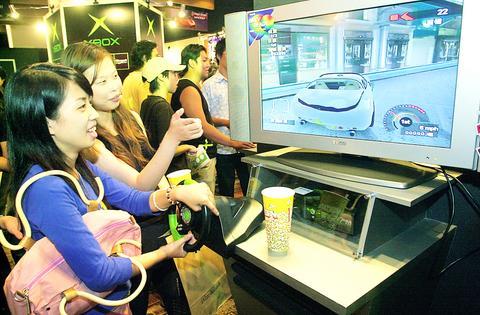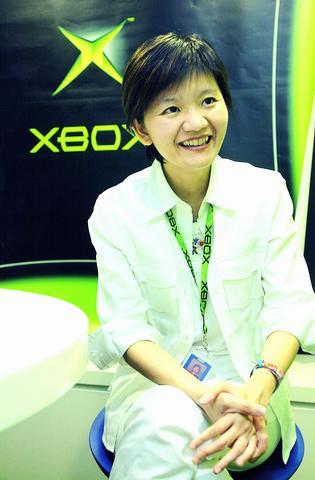Since the world's biggest computer software company Microsoft released XBOX two years ago, the game console market has become a battleground in the struggle between the US and the Japanese powerhouses.
XBOX is facing fierce competition from Sony's PS2 and the price reductions and PR strategies adopted by both companies have reached a fever pitch.
In Taiwan, the Chinese XBOX was released last Christmas and caused a frenzy among game-console fans. The direct advantage for consumers was that a PS2 console, which cost over NT$15,000 or even in some cases NT$20,000, dropped to less than NT$7,000.

PHOTO: GEORGE TSORNG, TAIPEI TIMES
"The result of price reductions has been market expansion. Apparently more people have become TV game consumers. According to Microsoft Taiwan's market analysis, XBOX has been attracting consumers who did not care for TV games, as well as those who were already into PC games. However, the switch of PS2 users to XBOX did not happen on a large scale," said Grace Chou (周文英), Microsoft Taiwan's Home and Entertainment Division Manager.
"This is like a war between the study and the living room. In the past a person would play the one-person game in his or her own room, but now family members like to be engaged in entertaining activities together, so more PC users also purchase a TV game console," Chou said.
In the past nine months, Microsoft Taiwan has held three major events and numerous small gatherings to market XBOX. Chou, however, is not willing to reveal the numbers of XBOX units sold, nor the company's market share. She only said that they had reached their sales targets.

PHOTO: GEORGE TSORNG, TAIPEI TIMES
"The strategy at the current stage is to allow everyone to try XBOX. We also want to accelerate the development of more new gaming software," said Chou, hinting at the key behind XBOX's slow market expansion -- too little available software.
According to rough data obtained from local retailers, as of July XBOX has sold about 350,000 consoles, and Microsoft has said that globally XBOX has sold over 9.4 million consoles with over 1 million in Asia. These numbers, however, still leave a lot to be desired compared with the PS series which has sold over 20 million consoles since its release in 1994.
"We hope we can reach the target of 14.5 million consoles by the end of this year," said Chou.
Gamebase Web site senior editor Lai Chun Kuang (賴俊光) said that many people thought that Japanese game software companies were not willing to develop software for XBOX because these companies naturally wanted to back up Sony and ensure PS2 users would not switch to XBOX. But Lai said that the situation should be analyzed from a commercial point of view.
"Sales of a console greatly affect a software company's desire to develop new software. Japanese companies are willing to spend millions of dollars to develop a PS2 game because if the game performs well it can sell millions of copies. Say that a game sells for about NT$2,000, and even if it only sells 300,000 to 500,000 copies, it can still make a good profit for the company. But an XBOX game can only sell a few thousand copies at best. With a situation like this, software companies surely are not willing to invest their money in XBOX game development," Lai said.
Tang Ming-lun (唐明倫), a senior game console user said that on the Internet, although PS2 did not perform as well as XBOX in terms of graphic resolution and calculation ability, Japanese software companies had been developing games specially designed to meet the TV game's properties and create amazing animation. The Japanese role-playing games, street fighting games, action adventure games and sports games were better than those for XBOX from the standpoint of animation and creativity, Tang said.
Meanwhile, Microsoft Taiwan's Chou stressed that her company had been communicating with major Japanese software companies, hoping that major games could have both PS2 and XBOX versions. Microsoft itself would also develop games, Chou said, and the company was planning to have over 160 Chinese XBOX games available before June next year.
So far KOEI from Japan has released an XBOX version of its best selling Shin Sangokumusou, Romance of the Three Kindoms, and Nobunaga's Ambition.
Besides better graphic performance, the other advantages XBOX holds over PS2 are the multimedia functions which offer a built-in hard drive for users to edit music, expand peripherals and retrieve vocals on-line.
But when XBOX was first released in 2001, the online function it promoted was still not widely available. Last year North America and Japan set up XBOX servers, and now Taiwan is testing local servers with 150 users. Local XBOX users are expected to be able to go on-line by next year.
"XBOX has already gained a firm place in the TV game console market, but in the past few years, on-line gaming has become the fad in Taiwan, so the real decisive moment between XBOX and PS2 will only come when XBOX starts to offer online services," Chou said.

June 9 to June 15 A photo of two men riding trendy high-wheel Penny-Farthing bicycles past a Qing Dynasty gate aptly captures the essence of Taipei in 1897 — a newly colonized city on the cusp of great change. The Japanese began making significant modifications to the cityscape in 1899, tearing down Qing-era structures, widening boulevards and installing Western-style infrastructure and buildings. The photographer, Minosuke Imamura, only spent a year in Taiwan as a cartographer for the governor-general’s office, but he left behind a treasure trove of 130 images showing life at the onset of Japanese rule, spanning July 1897 to

One of the most important gripes that Taiwanese have about the Democratic Progressive Party (DPP) is that it has failed to deliver concretely on higher wages, housing prices and other bread-and-butter issues. The parallel complaint is that the DPP cares only about glamor issues, such as removing markers of Chinese Nationalist Party (KMT) colonialism by renaming them, or what the KMT codes as “de-Sinification.” Once again, as a critical election looms, the DPP is presenting evidence for that charge. The KMT was quick to jump on the recent proposal of the Ministry of the Interior (MOI) to rename roads that symbolize

On the evening of June 1, Control Yuan Secretary-General Lee Chun-yi (李俊俋) apologized and resigned in disgrace. His crime was instructing his driver to use a Control Yuan vehicle to transport his dog to a pet grooming salon. The Control Yuan is the government branch that investigates, audits and impeaches government officials for, among other things, misuse of government funds, so his misuse of a government vehicle was highly inappropriate. If this story were told to anyone living in the golden era of swaggering gangsters, flashy nouveau riche businessmen, and corrupt “black gold” politics of the 1980s and 1990s, they would have laughed.

In an interview posted online by United Daily News (UDN) on May 26, current Chinese Nationalist Party (KMT) Chairman Eric Chu (朱立倫) was asked about Taichung Mayor Lu Shiow-yen (盧秀燕) replacing him as party chair. Though not yet officially running, by the customs of Taiwan politics, Lu has been signalling she is both running for party chair and to be the party’s 2028 presidential candidate. She told an international media outlet that she was considering a run. She also gave a speech in Keelung on national priorities and foreign affairs. For details, see the May 23 edition of this column,